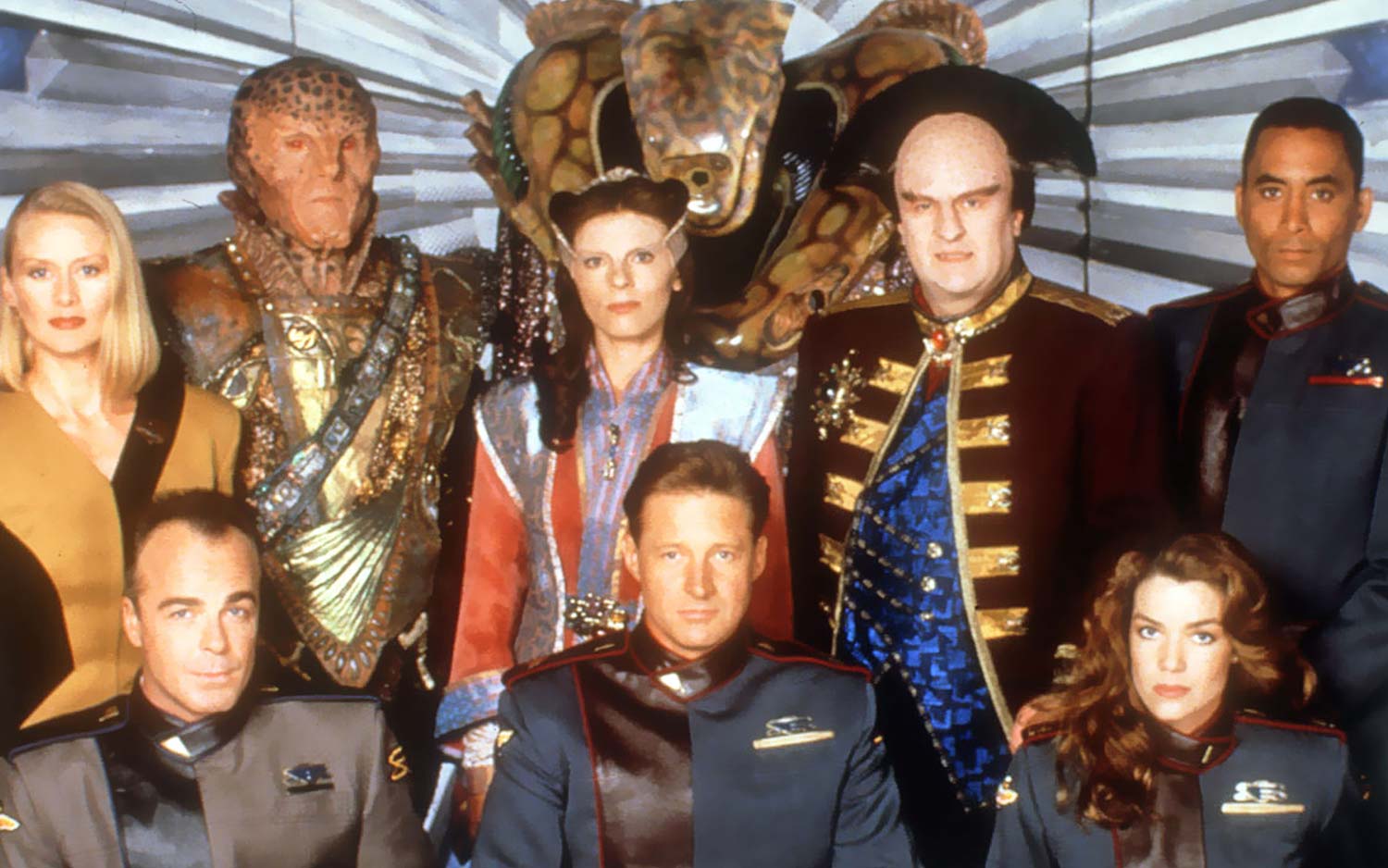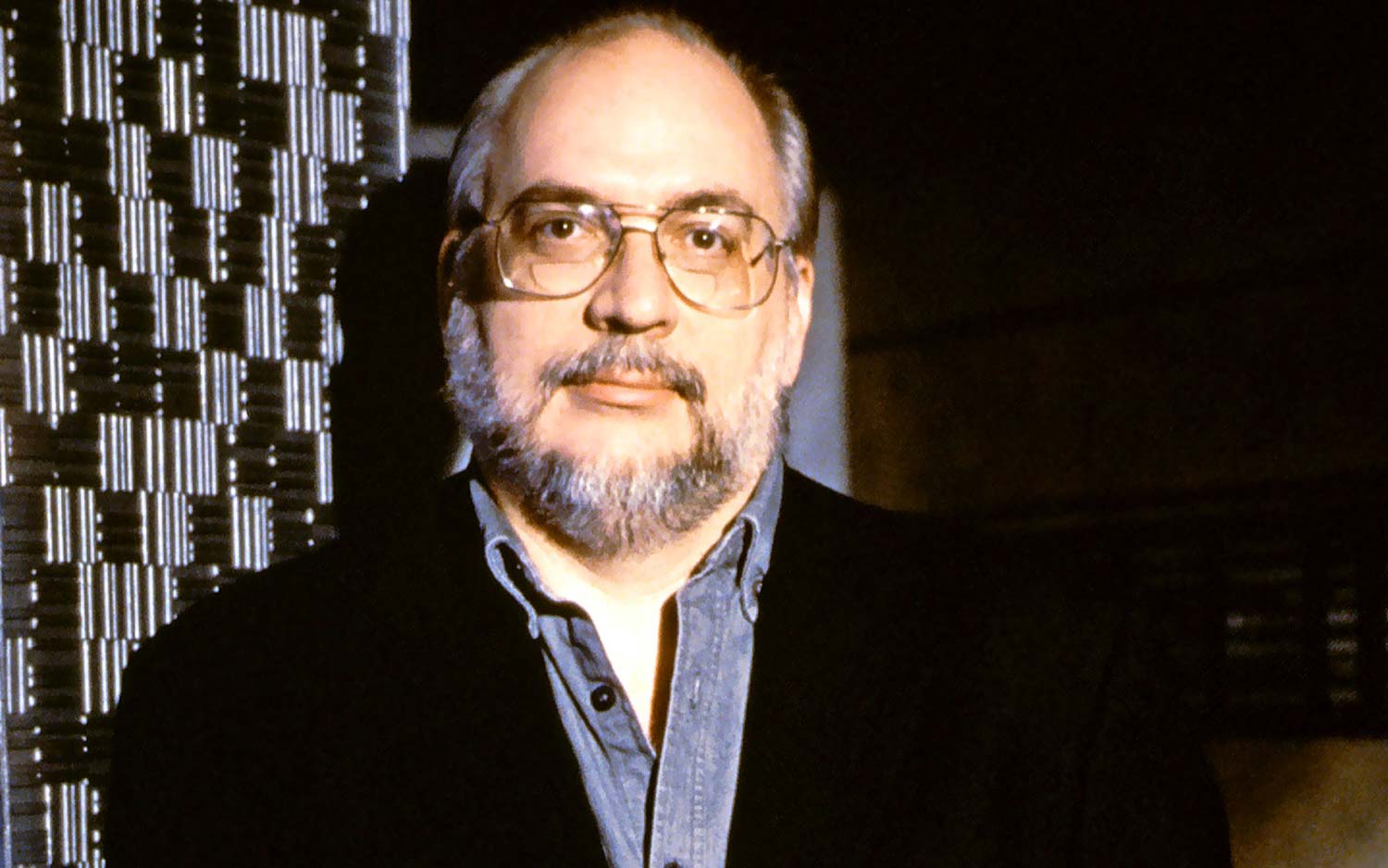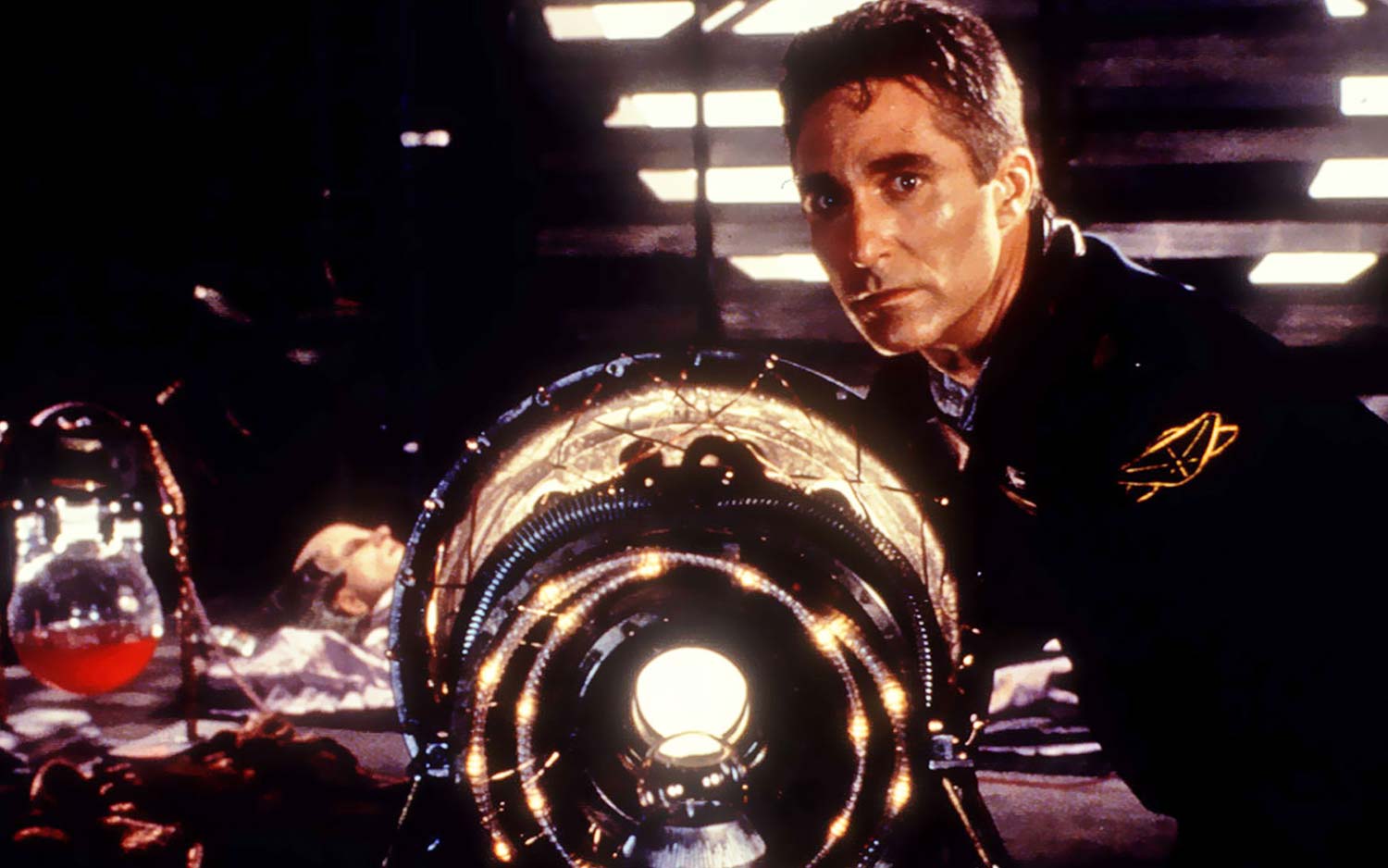Game of Thrones Wouldn’t Be a Phenomenon Without Babylon 5
Without the influence of 'Babylon 5', 'Game of Thrones' might not exist as the cultural phenomenon it is today.
On Sunday, April 14, I was gearing up to watch a TV show at 9 p.m. ET. I was extremely excited, as I'd been waiting a long time to kick off a new season and discovered what had happened to my favorite characters.

This show has a cohesive, ongoing story that planted seeds of an overarching narrative, right in the very first episode. The program has bold writing, and isn't afraid to kill off major characters to advance the story. The series has a passionate online following, a thoughtful creator who stokes the flames of fandom online, and an episode structure that requires you to tune in every week, or else miss out on major plot developments.
The show, of course, is J. Michael Straczynski's Babylon 5.
While the rest of the known universe settled in to watch Game of Thrones, I was perfectly content to watch a space opera from 1996. And while I stared at my computer screen, hearing the distant din of dragons and swords and plot twists coming from the living room TV, I couldn't help but reflect on how Game of Thrones might not exist without my humble little sci-fi adventure.
Oh, Game of Thrones would still exist as a TV show, of course — but perhaps not as a cultural phenomenon. The perfect storm of serial storytelling, consequential character departures, online hype, and ongoing creator input that made Game of Thrones so irresistible originated more than 20 years ago. If you love thumbing through Jon Snow memes on Twitter while refreshing George R.R. Martin's blog for updates on "The Winds of Winter" release date – knowing full well that your favorite character may not live through next week's episode – then spare a thought for the show that, just maybe, made it all possible.
The Babylon Project
If you’re unfamiliar with Babylon 5 (which you can stream in its entirety on Prime Video), the story goes like this: J. Michael Straczynski (known affectionately by fans as JMS) is a television writer who's worked on everything from He-Man and the Masters of the Universe to Murder, She Wrote. Back in 1989, he pitched Paramount Pictures on a Star Trek series that would take place on a space station rather than a starship, and involve an ongoing galactic war rather than peaceful adventures-of-the-week. Paramount turned him down.
Get instant access to breaking news, the hottest reviews, great deals and helpful tips.

Three years later, though, JMS successfully pitched the same idea to Warner Bros. Entertainment Inc., which commissioned a pilot called Babylon 5: The Gathering. While a little rough around the edges, The Gathering set up the main thrust of the show: a space station staffed by a crew of officers from Earth who had to wrangle alien diplomats – while keeping the brass happy back home .
When a full season premiered in 1994, it became clear that Babylon 5 wasn't going to coast on its initial premise forever. Within the first half of Season 1, viewers started to learn about a mysterious alien race that had ravaged the galaxy 1,000 years ago, a conspiracy brewing back on Earth that could destabilize the entire station, and a religious movement that seemed to put the show's commander right at its center.
Important guest stars started to reappear, and events carried over from one episode to the next. This is because JMS himself conceived Babylon 5 as a "novel for television," set to run for five years right from the start. In an era before DVD box sets, DVRs, on-demand programming, and streaming video services, Babylon 5 expected its audience to catch every episode, pay close attention, and retain information between episodes – arc-to-arc and season-to-season. Luckily, the Internet was there to help.
Sort of.
The Early Internet
Think about what Game of Thrones would look like without social media. Take it a step further: What would Game of Thrones be without an enthusiast press? Without message boards? Without a website?
Believe it or not, these were the conditions under which Babylon 5 debuted. But that didn't prevent dedicated fans from getting online and creating a dedicated space for reviews, theories and every other kind of commentary under the sun. Rather than Twitter, early Babylon 5 fans took to Usenet.
You may remember Usenet as the functional precursor to communities like Reddit; you may also remember it from a surprisingly prescient Simpsons joke. Briefly, Usenet was (and, technically, still is) an online newsgroup system that lets users post public messages and reply in threads and sub-threads. Connecting was a little arcane, however, meaning that discussion was open only to tech-savvy posters.
MORE: How to Watch Game of Thrones Season 8 Online
Babylon 5 was by no means the first or only show to have a dedicated Usenet community. Twin Peaks had one, The X-Files had one and, yes, The Simpsons had one. (Click the Twin Peaks link to discover just how similar 29-year-old Usenet discussions looked to Reddit discussions today.) But it was the first Usenet group in which the show's creator took an active, persistent role.
JMS was no stranger to the Babylon 5 Usenet group (rec.arts.sf.tv.babylon5.moderated, which is still up and running today). Straczynski stopped by often to shoot the breeze with fans, but he was not shy about discussing the show's themes, controversies and behind-the-scenes drama. While the screenwriter didn't give away upcoming plot points, for obvious reasons, it was unprecedented for fans to have such easy and direct access to a show's creator.
Babylon 5 predicted a lot about how we currently interact with TV serials, and why our current favorites look very different than our top series decades ago.
If you've followed (or interacted with) George R.R. Martin on Twitter or Livejournal, you can thank JMS for paving the way. Naturally, having the creator himself tease upcoming developments was an early, and effective, form of online advertising. (Consider how often you've seen Game of Thrones advertised on the Internet versus in other forms of media.)
Finally, consider The Lurker's Guide to Babylon 5, a fan site that's been around since 1993. While Babylon 5 was by no means the first show to have a fan site (that honor probably goes to Star Trek, whose online presence grew out of the fanzines of the 1960s), The Guide is notable for debuting before Babylon 5 itself launched. Consider word-of-mouth marketing today, and just how much heavy lifting HBO expects its fans to do in order to promote each new Game of Thrones episode, and you'll have a good idea of why The Lurker's Guide was so prescient.
As it turns out, our own Matthew Murray, managing editor at Future Labs, was one of the biggest contributors to the Guide, and shared a few thoughts on what made it so successful.
"Rather than just tell you what happened, 'The Lurker's Guide' pulled apart each episode and let you inspect the component pieces to see how everything worked," Murray said. "It also collected JMS's posts from multiple message boards and newsgroups … Because he was unusually candid about the creation and execution of the show, you learned things about Babylon 5 and Hollywood you couldn't learn anywhere else," he continued.
"The technology and tools that exist today allow fans to do far more than 'The Lurker's Guide' could then, but the site's maturity and thoughtfulness, combined with its obsessive attention to detail, were really what set it apart then — and now," Murray said.
Prestige TV Before the Prestige
Without the Babylon 5 online fandom back in the '90s, the Game of Thrones phenomenon could have looked very different today. But even apart from its fans, Babylon 5 itself predicted a lot about how we currently interact with TV serials, and why our favorite ones now look very different than our favorite series from decades ago.
Until recently, episodic shows were the norm. A completely different story unfolded each week, and all the pieces more or less reset by the end of each episode.
This was the most logical approach, considering that there was no way to guarantee that viewers would watch every episode — and if they missed one, there was no easy way to see it again. Even well into the '90s, ambitious shows like Star Trek: The Next Generation, Buffy the Vampire Slayer, and Picket Fences relied on episodic structures, with some arcs that lasted for a season, and almost no arcs that lasted for a show's entire run.
Compare and contrast that structure to Game of Thrones, where every episode flows directly into the next one, and it's almost impossible to pick up a new season without having seen the previous one.
Like Game of Thrones, Babylon 5 eschewed the episodic structure almost immediately. Right from The Gathering – the pilot – it was clear that Cmdr. Jeffrey Sinclair (the show's first lead character — we'll get back to him) had a greater role to play in the show's overall mythos. There was foreshadowing, prophecy and plot twists that changed characters' relationships dramatically. While not every one of the show's 110 episodes are equally important to the plot, almost every episode moved the story forward somehow. This also meant that characters would frequently recap what had happened over the last few episodes, for the benefit of viewers who hadn't been able to tune in.
Relying on heavy continuity was a risky move in the mid-'90s, but look at how many other shows followed suit, from Star Trek: Deep Space Nine and Oz, to The Sopranos and The West Wing later in the decade. Prestige TV that plays out like long, episodic movies is commonplace today, but back then, the format asked a lot of viewers.

The reason that Babylon 5 went above and beyond was because the whole story was in place from the outset — just like the story in Game of Thrones. Narrative threads introduced in the very first episodes of these shows take until the very last episode to wrap up. Think of how few other shows have begun with precise endings in mind; not even Deep Space Nine can make that claim.
MORE: Game of Thrones Recap: What to Know Before Watching Season 8
And, of course, we can't discuss Game of Thrones without discussing characters' deaths. As much as fans may rail against their favorite characters being written out, the unpredictable cast changes are a big part of the show's appeal. No one is guaranteed to live through an episode, no matter how "vital" they are to the plot. Look at the opening credits today versus the opening credits from Season 1; the cast looks very different.
Babylon 5 was not quite as cavalier about killing characters, but the show had a notoriously changeable cast. Granted, this was sometimes due to actors having to leave, but only half of the regular cast from Season 1 made it all the way to Season 5. In fact, Cmdr. Sinclair himself was one of the first characters to leave, departing at the end of the very first season. (Not unlike Ned Stark, the first major protagonist in Game of Thrones, exiting just before Season 2.) While fans weren't exactly making bets on which characters were going to live through the week, they accepted that any character could get written off, and that the story could change considerably as a result.
A Dream Given Form
Of course, it's simplistic and inaccurate to say that Game of Thrones can trace all of its success to a mid-budget sci-fi show from the '90s — one which may or may not have made any money and never attracted a massive audience, at that. Game of Thrones is an exceptionally well-made show, adapted from a bestselling book series that resonates in a big way with a diverse and passionate fan base.
And yet, it's hard to ignore the parallels. The combination of a continuity-heavy story about a massive war, formatted like a novel, with an ever-changing cast, buoyed by a vocal online community, supported by a communicative creator, and hyped by sophisticated advertising that makes catching every episode an absolute necessity —there might just be something there.
I can't help but remember that before Game of Thrones came out, fans had no idea whether the series would succeed. Would a massive, mainstream audience really get invested in a fantasy series, particularly one with an extremely complex narrative and very few "central" characters to keep it all anchored? The stars aligned, and the answer was "yes."
Had the Internet been just a little bit further along when Babylon 5 debuted, I wonder if the answer would have been "yes" for that show, as well.

Marshall Honorof was a senior editor for Tom's Guide, overseeing the site's coverage of gaming hardware and software. He comes from a science writing background, having studied paleomammalogy, biological anthropology, and the history of science and technology. After hours, you can find him practicing taekwondo or doing deep dives on classic sci-fi.
-
webworkings B5 was my fav show. Normally when you ask me what my fav of anything is, I don't really have a specific one. I like so many things, and rarely do I like all or almost all of something. I always see the flaws, but B5 was different. Yes, it had its flaws, a few whoppers, and while the hair and clothing may be very dated, the show is still a great one.Reply
Favorite characters? Delenn and G'Kar. But I have to say, it is one of the few shows that had a great cast. So many are carried by one of two characters, not that one.
Now I have to go on another B5 binge. LOL
